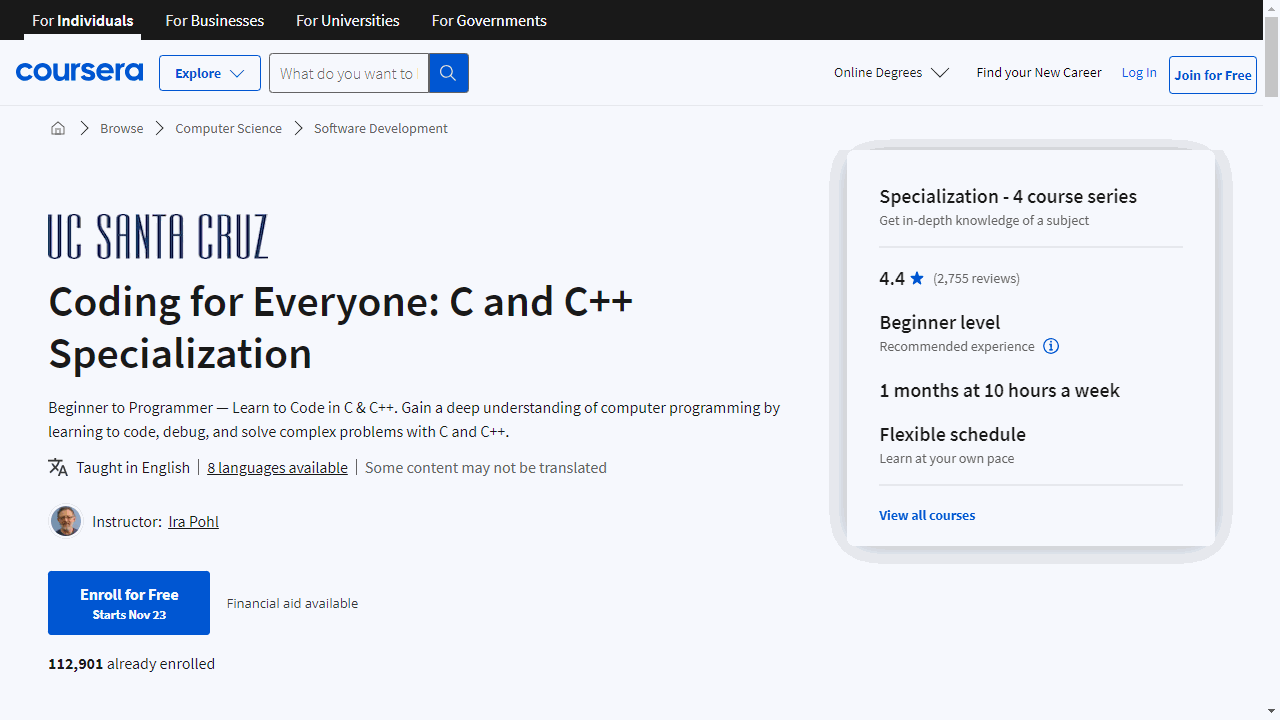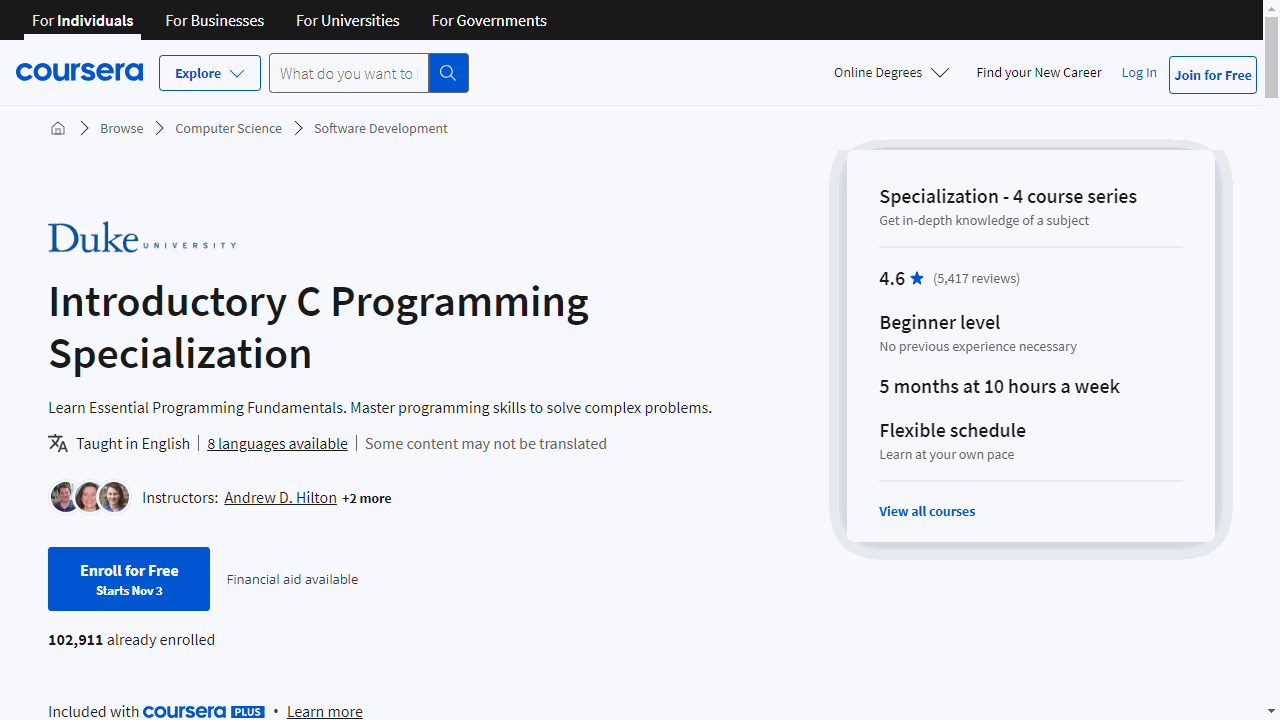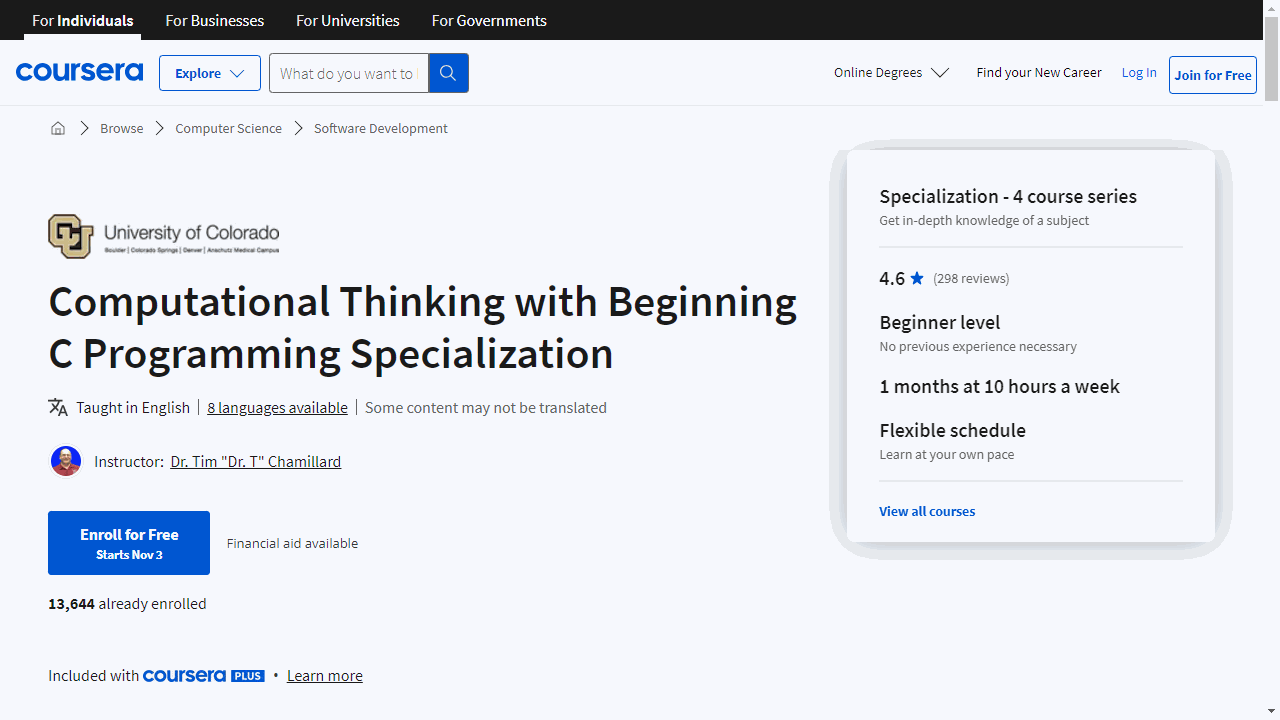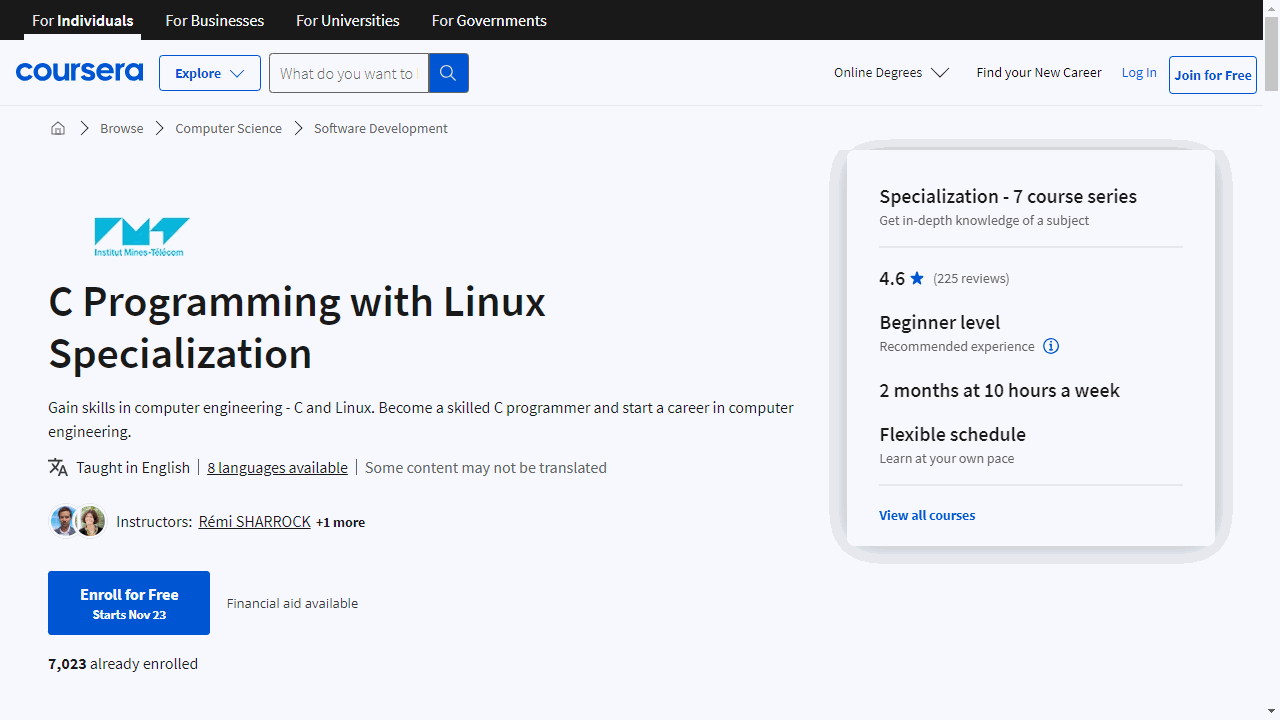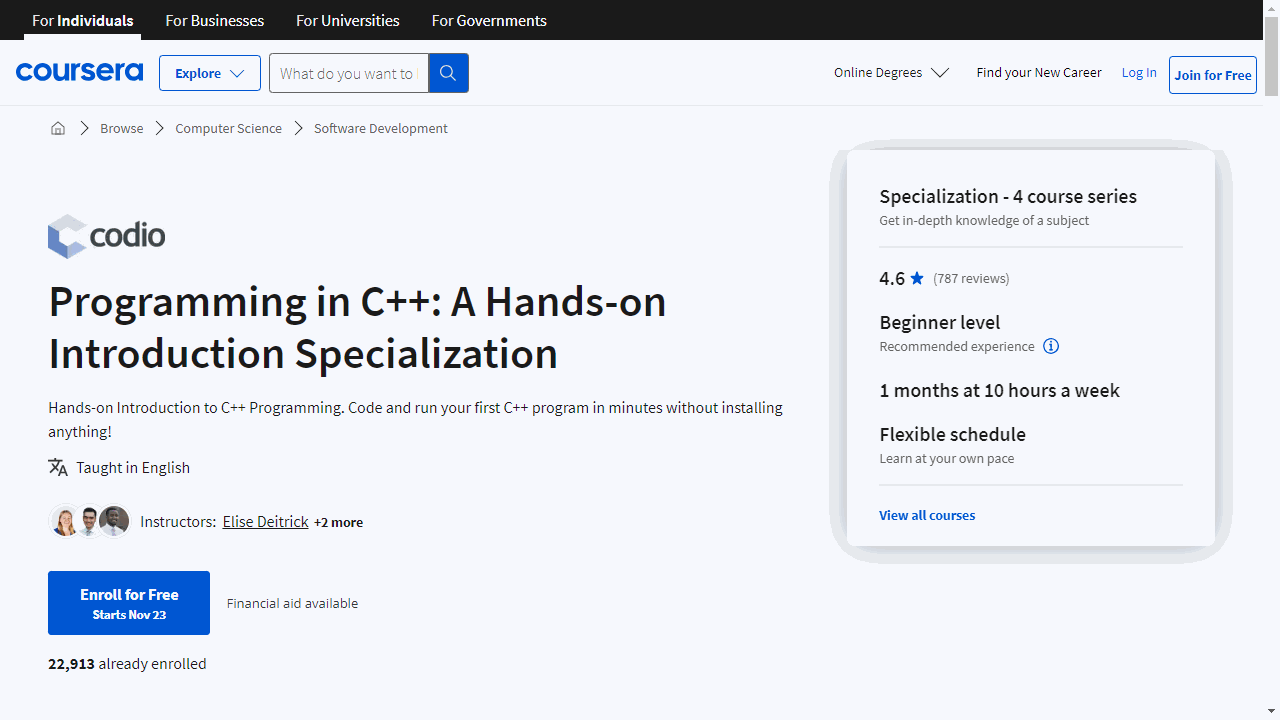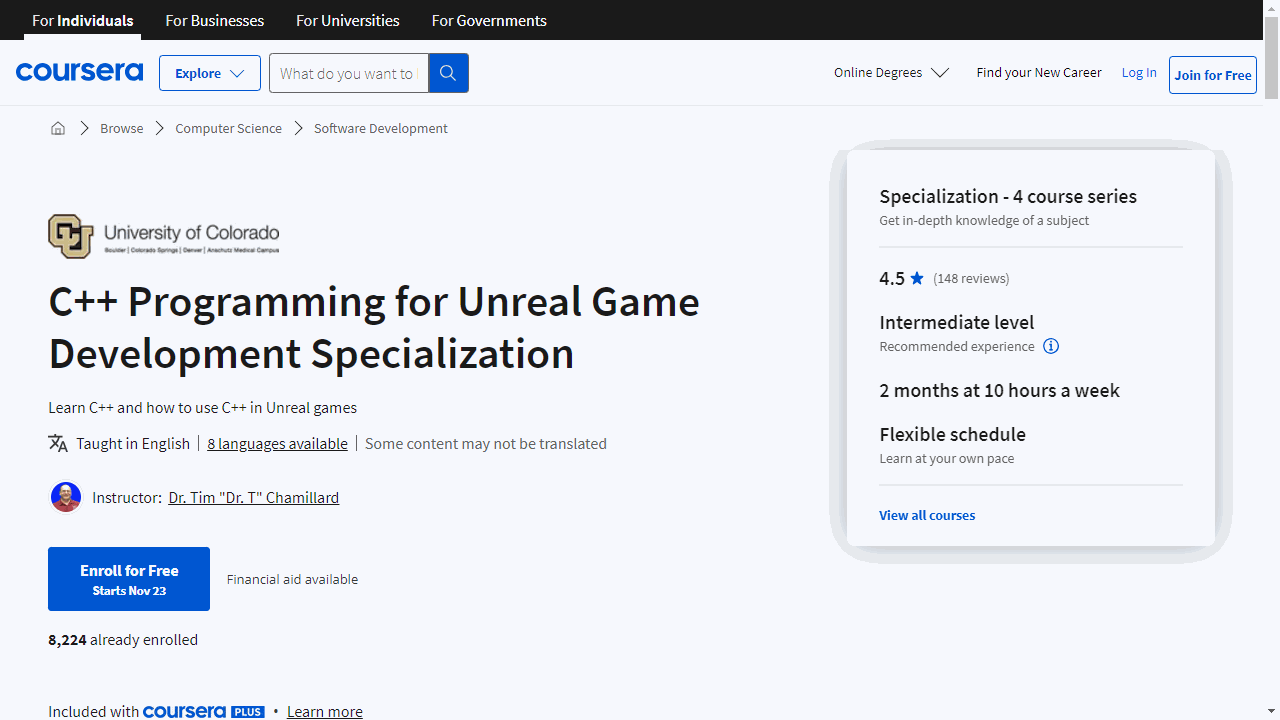C is a powerful and widely-used programming language known for its efficiency and control over system resources.
Learning C can open doors to diverse career paths, from embedded systems development to game programming and high-performance computing.
Mastering this language equips you with the ability to write code that interacts directly with hardware, giving you a deep understanding of how software works under the hood.
Finding the right C programming course on Coursera can be a challenge, with many options available, each with its own approach and focus.
You’re looking for a program that provides a solid foundation in C, guides you through essential concepts, and allows you to build practical skills through hands-on projects.
For the best C programming course overall on Coursera, we highly recommend “Coding for Everyone: C and C++ Specialization.”
This four-course series offers a comprehensive learning path, starting with the fundamentals of C and progressing to more advanced concepts like pointers, memory management, and object-oriented programming using C++.
The courses are expertly crafted, employing clear explanations, engaging visuals, and practical exercises to help you grasp even the most complex concepts.
While this specialization stands out as our top pick, there are other fantastic C programming courses available on Coursera.
Keep reading to discover more recommendations tailored to different skill levels and learning styles, including introductory courses for beginners, advanced tracks for experienced programmers, and specialized options focused on specific application areas like game development or embedded systems.
Coding for Everyone: C and C++ Specialization
This specialization begins with “C for Everyone: Programming Fundamentals,” a course tailored for beginners.
You’ll learn to write, compile, and debug your first programs, gaining a solid foundation in arrays, pointers, and functions.
This course demystifies coding, setting you up for success with no prior experience necessary.
Next, “C for Everyone: Structured Programming” takes your foundational knowledge further.
It’s essential to complete the fundamentals course before diving into this one, as it builds on what you’ve already learned.
You’ll enhance your C skills and get an introductory peek at C++, preparing you for more advanced programming concepts.
For those already comfortable with C, “C++ For C Programmers, Part A” transitions you into the world of C++.
This course focuses on converting C programs to C++ and introduces you to essential container classes and Dijkstra’s algorithm, expanding your problem-solving toolkit.
Lastly, “C++ For C Programmers, Part B” rounds out your learning experience.
Here, you’ll delve into the Standard Template Library, explore inheritance logic, and compare game-playing algorithms.
This course is designed to refine your C++ skills and give you a competitive edge.
With a practical, hands-on approach, you’ll acquire skills that are highly sought after across various industries.
By dedicating just ten hours a week, you can transform your understanding of coding with these well-structured and expert-led courses.
Introductory C Programming Specialization
This four-course series will take you from having zero knowledge to being able to write complex C programs by the end.
The first course, Programming Fundamentals, is the perfect introduction.
You’ll learn the core concepts of programming like algorithms, pseudocode, and problem solving strategies. The instructor does a great job breaking down the foundational skills in an approachable way.
In the second course, Writing, Running, and Fixing Code in C, you’ll go from planning programs to actually writing real C code.
The course guides you through compiling, running, testing, and debugging programs. This is where you’ll start to feel like a real programmer!
The third course covers more advanced topics like pointers, arrays, and recursion.
These powerful techniques will allow you to write far more complex programs. The teacher takes the time to explain these concepts clearly.
Finally, the fourth course shows you how to build programs that interact with users, files, and manage memory dynamically. You’ll learn skills like taking user input, reading and writing files, and allocating memory as needed while a program runs.
By the end of the Specialization, you’ll be able to code in C with confidence.
You’ll have a portfolio of programs showcasing your new skills to share with employers or to build on for future learning.
Computational Thinking with Beginning C Programming Specialization
C is a heavily used programming language that is harder to learn than Python or Java. It might not be the best choice for your first programming language, but it’s a great option if you are up for a challenge.
You’ll start by learning foundational concepts like algorithms, data collection, and writing your first C program. The material builds from there, covering key programming topics like data types, variables, selection, iteration, arrays, strings, and functions.
A major highlight is the focus on computational thinking - breaking large problems into smaller steps. This trains you to think logically and develop effective programs, skills that apply to any programming language.
The courses also connect concepts to real-world STEM applications so you can see how programmers solve practical problems.
While challenging at times, the material is presented clearly in bite-sized modules so you can master each concept.
C Programming with Linux Specialization
This specialization is designed to build a strong foundation in both C programming and Linux, two critical skills for modern tech professionals.
The journey begins with “C Programming: Getting Started,” where you’ll hit the ground running, coding directly in your browser.
This course simplifies the learning process, making it accessible even if you’ve never written a line of code.
You’ll learn to create basic programs, handle variables, and use loops to automate tasks.
As you progress to “C Programming: Language Foundations,” you’ll tackle logical statements and arrays, essential tools for data organization and decision-making.
This course also introduces you to algorithms for sorting and searching, skills that are transferable across many programming languages and highly valued in the tech industry.
In “C Programming: Modular Programming and Memory Management,” the focus shifts to functions and pointers, demystifying how memory is accessed and managed in C.
The course’s innovative tools help visualize these complex concepts, ensuring you understand pointers thoroughly, a topic often considered challenging by new programmers.
Building on this knowledge, “C Programming: Pointers and Memory Management” delves deeper into pointer arithmetic and dynamic memory allocation, empowering you to manage memory efficiently and write more sophisticated programs.
The fifth course, “C Programming: Advanced Data Types,” teaches you to define and manipulate your own data types.
This ability allows for more structured and efficient data handling, a skill that can significantly enhance the functionality of your programs.
“Linux Basics: The Command Line Interface” transitions your focus to Linux, the operating system that powers countless devices and servers worldwide.
You’ll become proficient in navigating the Linux file system and using command-line tools, a must-have skill for any serious developer.
Finally, “C Programming: Using Linux Tools and Libraries” rounds out the specialization by introducing you to the professional environment of C programming within Linux.
You’ll learn to utilize libraries, compile multiple source files, and automate building processes with makefiles.
By the end of the specialization, you’ll have a solid grasp of C programming, command-line proficiency, and the ability to work with Linux tools and libraries, setting you up for success in the tech industry.
Programming in C++: A Hands-on Introduction Specialization
This series is a practical, step-by-step journey into the world of C++, tailored for those with little to no coding background.
Start with “C++ Basics: Selection and Iteration,” where you’ll swiftly code your first C++ program, bypassing any setup hassles.
This course lays the groundwork, teaching you to manipulate data with variables and operators, automate tasks with selection statements, and efficiently repeat processes using loops.
It’s a foundational course that equips you with essential skills and a strong understanding of basic computer science concepts.
Progress to “C++ Basic Structures: Vectors, Pointers, Strings, and Files,” which builds on your newfound knowledge.
Here, you’ll learn to manage collections of data using vectors, navigate through your code with pointers, handle textual data with strings, and perform file operations.
This course ensures you’re comfortable with more complex data structures, setting you up for success in advanced programming tasks.
As you advance, “C++ Object Basics: Functions, Recursion, and Objects” introduces you to the power of functions for modular code, recursion for complex problem-solving, and objects for organizing your code.
This course is like the toolkit that helps you refine your coding approach, making your programs more efficient and your coding style more sophisticated.
The final course, “Object-Oriented C++: Inheritance and Encapsulation,” takes you into the realm of object-oriented programming.
You’ll learn to design robust programs using inheritance to share functionality and encapsulation to protect data integrity.
This course is the capstone of your learning experience, where you apply principles that are fundamental to professional C++ development.
Each course in this specialization is interactive and self-paced, featuring a video-free format that emphasizes hands-on learning.
You’ll engage with the material through immediate feedback on exercises, ranging from quick quizzes to coding tasks.
This approach ensures a deeper understanding of the material, as you’re actively involved in the learning process.
It’s designed to take you from beginner to proficient, with a focus on practical skills that are applicable across various programming languages.
C++ Programming for Unreal Game Development Specialization
If you’re searching for top-notch C++ programming courses with a focus on game development, this specialization is for you.
This series of courses is tailored for individuals with some programming know-how who are eager to master C++ within the context of the Unreal Engine.
The journey begins with “Introduction to C++ Programming and Unreal,” where you’ll craft your initial C++ console application and dip your toes into Unreal scripting.
It’s a solid foundation, covering data storage, object-oriented programming, and the basics of the Unreal Engine.
Progressing to “More C++ Programming and Unreal,” you’ll delve into decision-making logic, player input, loops, and data management with arrays and Unreal’s TArray container.
This course builds on your initial knowledge, setting you up for more complex programming tasks.
In “C++ Class Development,” the focus shifts to software abstraction, function mechanics, and class design.
You’ll integrate Unreal classes into games and tackle pointers, enhancing your understanding of game mechanics and sound implementation.
The final course, “Intermediate Object-Oriented Programming for Unreal Games,” polishes your skills.
You’ll manage file input/output, leverage inheritance and polymorphism, and implement event handling.
The course culminates in the development of a complete Unreal game, solidifying your learning experience.
Each course in this Specialization is designed to be practical and hands-on, moving you from foundational concepts to advanced game development techniques.
By the end, you’ll have a portfolio of skills and projects that showcase your ability to use C++ and Unreal Engine effectively.
